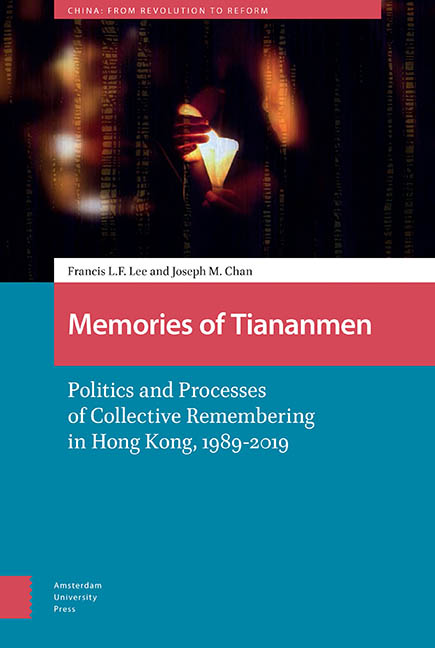Book contents
- Frontmatter
- Contents
- List of Figures and Tables
- Acknowledgments
- List of Abbreviations
- 1 Introduction
- 2 Memory Formation and the Valorization of Commemoration
- 3 Memory Mobilization
- 4 Intergenerational Memory Transmission
- 5 The Struggle for Memory Institutionalization
- 6 The Challenge of Localism and Memory Repair
- 7 Changing Attitudes toward Tiananmen?
- 8 Digital Media and Memory Balkanization
- 9 Conclusion
- Epilogue
- Appendix
- References
- Index
1 - Introduction
Published online by Cambridge University Press: 16 July 2022
- Frontmatter
- Contents
- List of Figures and Tables
- Acknowledgments
- List of Abbreviations
- 1 Introduction
- 2 Memory Formation and the Valorization of Commemoration
- 3 Memory Mobilization
- 4 Intergenerational Memory Transmission
- 5 The Struggle for Memory Institutionalization
- 6 The Challenge of Localism and Memory Repair
- 7 Changing Attitudes toward Tiananmen?
- 8 Digital Media and Memory Balkanization
- 9 Conclusion
- Epilogue
- Appendix
- References
- Index
Summary
Abstract
Chapter 1 articulates the core research questions underlying the book's analysis and highlights the theoretical and social significance of the case of collective remembering of the Tiananmen crackdown by Hong Kong society. It discusses the conceptualization of and perspective on collective memory adopted by the book. The processual approach and the six memory processes to be examined are explicated. The chapter also provides information about the methods utilized.
Keywords: collective memory, counter-memory, memory processes
How people remember the past is a crucial factor shaping their identity, perceptions of present reality, and ideas about a desired future. In the political arena, actors with varying interests thus have the incentives to construct and promote certain versions of the past and undermine others. Representations and narratives of the past are therefore often subject to contestation. Such contestation has a substantial impact on public opinion, policymaking, and the long-term political development of society.
These arguments are now well-established in the study of collective or social memory. An important strand of analysis in the literature has focused on how counter-memories – a concept often attributed to Foucault (1977) – can be developed to challenge a society's dominant collective memory (e.g., Gutman, 2017; Verberg & Davis, 2011; Walkowitz & Knauer, 2011; Whitlinger, 2015). In such analyses, a representation of the past is dominant in two senses simultaneously: it is the most widely circulated, accepted, or even canonized version of the past in the public arena, and it serves the interests of the dominant social group or the state. Beyond the dominant collective memory, there can be “an unarticulated system of communicative and cultural references to the past and common experiences” shared by members of subordinated groups (Molden, 2016: 136). These references and experiences are the materials for the production of counter-memories. In multicultural societies, counter-memories “offer socially excluded groups a sense of ownership […] [and also] transform dominant narratives and help produce a more nuanced and just understanding of the past” (Weedon & Jordan, 2012: 150). In the context of Gramscian hegemonic struggles, counter-memories are crucial weapons for challenging ideological domination (Misztal, 2003).
- Type
- Chapter
- Information
- Memories of TiananmenPolitics and Processes of Collective Remembering in Hong Kong, 1989–2019, pp. 15 - 46Publisher: Amsterdam University PressPrint publication year: 2021

